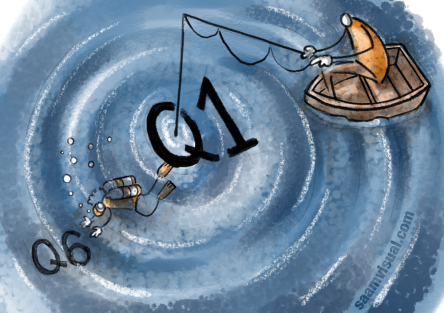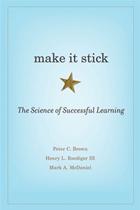Image: @jasonramasami
A few years ago, still under the spell of the starter/main/development/plenary model of my teaching training, I began to stray. My distinctly unimpressive timekeeping meant that I would usually find myself doing the plenary of the previous lesson as the starter of the next.
Over time, I felt that I had cottoned on to something. By leaving the plenary to the next lesson, it seemed to force students to recollect what they had covered previously. This retrieval of prior learning would then, naturally, catapult us into the current lesson. It seemed to make a lot of sense. Especially when reading a longer text, I would use a quiz to cue memory of the key events and ideas we had covered. The trick was to use these simple closed questions as points of reference in a broader class discussion. If I asked in the quiz, “What were George and Lennie wearing in the opening pages of Of Mice and Men,” as we went through the answers I would ask students to elaborate – with, say, “What do we associate denim with and what might this indicate about the lifestyle of workers like George and Lennie?” The quiz questions encouraged the recall of points of knowledge (a place-name on a map you might say) to cue more conceptual connections later on (the interconnection of roads and highways that link together such isolated places, for instance).
As often in teaching, simple, straightforward ideas are usually the most effective. Make It Stick (2014) by Brown, Roediger and McDaniel – a must-read by the way – centralises the idea of spaced retrieval practice, in the form of regular short-answer quizzing, as a means of consolidating knowledge in the memory.
“Quizzing provides a reliable measure of what you’ve learned and what you haven’t yet mastered. Moreover quizzing arrests forgetting. Forgetting is human nature, but practice at recalling new learning secures it in memory and helps you recall it in the future.
Periodically practicing new knowledge and skills through self-quizzing strengthens your learning of it and your ability to connect it to prior knowledge.”
They go on to suggest that quizzing is a far more powerful tool than re-reading texts and notes or listening to the teacher explain again. Such strategies create ‘illusions of fluency’ – we convince ourselves we know it because it makes sense in the moment, yet very soon it will inevitably slip from memory. Even more interesting is the finding that memory retrieval is most useful at the point of forgetting. The more effort we put in to remember, the more fruitful the practice is.
As a result my quizzes have morphed into what I have now – rather grandiosely – dubbed ‘memory platforms’. The first 10 minutes of most lessons are dedicated to a memory task – a task in which each individual, on their own, is compelled to retrieve stuff from their memory without recourse to any cues or materials. I have also extended the scope of the quizzes by nodding to the beneficial techniques of spacing (the need to space-out retrieval) and interleaving (that learning things side-by-side is more beneficial than in a mass).
My quizzes now appear something like this:
Q1 – Q3 – retrieve key knowledge from last lesson.
Q4 – retrieve key knowledge from last week.
Q5 – retrieve key knowledge from last term.
Q6 – retrieve key knowledge from last lesson and connect it to knowledge from last term.
The potential permutations of this kind of quizzing are huge, so what follows is just a possible example.
- Which word is missing from this line? “I sit in the _____ of the wood, my eyes closed.”
- What is the hawk from the poem a personification of?
- What does the hawk now hold in its foot?
- What did the hare in Bayonet Charge symbolise?
- Which character from An Inspector Calls is said to be ‘cold’ in the opening stage directions?
- Which character from Of Mice and Men does the hawk most resemble?
The students will do the quiz as soon as they enter – it’s a good settler task. I am not convinced, however, that the retrieval of atomised facts is enough in itself. The trick is in asking students to elaborate so that they switch from surface knowledge to deeper knowledge. My theory is that answering the questions improves the retrieval of the simple facts onto which more complex knowledge can be pegged. Questions like number 6 above are so useful in that they not only allow for more complex feats of retrieval, they also feed-forward into lively discussion.
It is worth mentioning now that quizzing is not the only means suggested in Make It Stick. Indeed, the book suggests that we teach ‘elaboration’, the process of finding additional layers of meaning in new material, to further aid retention. This might be by relating our new learning to what we already know or explaining how the material relates to life outside the classroom. ‘Memory platform’ tasks could consist of:
- Explain how the poem we learnt about yesterday relates to the novel we read last term.
- A tell B five things you remember about ‘x’; now B tell A five things you remember about ‘y’.
- How does the character relate to a person you know?
Reflection is also a useful tool. Ask students to review what went well last lesson, how it might have gone better and what they feel they need to understand more of. This task, as long as the original notes are put to one side, again goes beyond superficial retrieval.
The central idea of the ‘memory platform’ is to ring-fence classroom time for memory retrieval. One of the advantageous side-effects of the strategy is that when you start regularly creating these kinds of tasks, you start paying more attention to memory in day-to-day lessons. I am much more likely to remind students of previous learning during lessons than I ever was. This is because I have to remind myself when designing the lessons! Interestingly, students are also primed: they are now making more connections than they ever were before as a result of these tasks. Moreover, as we cannot ask students to retrieve everything we have ever covered, it helps us to simplify our teaching by discriminating between important knowledge and less-important.
There are of course many, many ways to give memory more significance in our classrooms. This is just one I have been developing. I hope it is of some use.
Robert Bjork’s is one of the leading researchers in this area. His Learning and Forgetting Lab is a great place to start investigating this area.
One of the most successful science teachers at my school – with years and years of incredible exam results to her credit before she retired – swore by regular quizzing. Shaun Allison interviewed her here.


Hi Andy, I have always felt that quizzing at/near start of lesson is a brilliant memory tool and one that I have used on SEN students, although not to this extent, as lesson and time don’t usually permit. It helps me to remember also. I often ‘quiz’ in last 10 mins of the lesson if I can.
I quizzed in the last lesson before in-school exams this year, rather than recapping material as per a standard revision lesson, and then gave students the marksheet to help them identify their remaining gaps before exams. I’m hoping it assisted in cementing their knowledge and in helping them decide what to focus their remaining limited time on.
Reblogged this on The Echo Chamber.
Pingback: Round and round we go: teaching English in spirals | Reflecting English
Pingback: The Benefits of Regular Retrieval Practice | Class Teaching
Pingback: Closed-question quizzing – unfashionable yet effective | Reflecting English
Pingback: Even Better If…I add quizzes | #TeachGeog
Pingback: Time-Saving Pedagogy – 12 Practical Ideas, by @Powley_R | UKEdChat - Supporting the Education Community
Pingback: 10 strategies for ‘talk-better’ teaching | Reflecting English
Pingback: The Problem with Plenaries | mrbunkeredu
Pingback: Edssential » Memory platforms
Pingback: Sequencing lessons in the run up to exams | Reflecting English
Pingback: Memory platforms | Articles and blogs for ACC |...
Pingback: Knowledge organisers for GCSE Computing | @mrocallaghan_edu
Pingback: Improving recall in GCSE English language and literature: some practical suggestions | Reflecting English
Pingback: TWA briefing Monday 27.6.16 – Knowledge | anewhoffod
Hi,
Would it be ok for me to use your blog as “blog of the week” for our school Teaching and Learning Website. We are using your book as a basis for one of our TLC strands. Already bought quite a few copies.
Great book by the way! Really enjoyed it.
Jason
Go for it! I’m glad you’ve found the book to be of use.
Pingback: Memory Platforms by Andy Tharby | George Green's Expressive Arts
Pingback: A master plan for vocabulary teaching in the English curriculum | Reflecting English
Pingback: 5 Ways To Make Knowledge Stick | @TeacherToolkit
Pingback: A ‘Mastery-light’ Subject Curriculum Model | Class Teaching
Pingback: I’ve got my Knowledge Organisers – now what? | Kennet School Learning Blog
Pingback: The Benefits of Regular Retrieval Practice | Class Teaching
Pingback: GCSE revision ideas – test your memory: some tips for you – The Secret Geek Reflects
Pingback: 5 Tips For Live Displays | TeacherToolkit
Pingback: Messy Planning: Part Two – All Ears
Pingback: Pedagogy | Pearltrees
Pingback: Retrieval Practice For Revision | TeacherToolkit